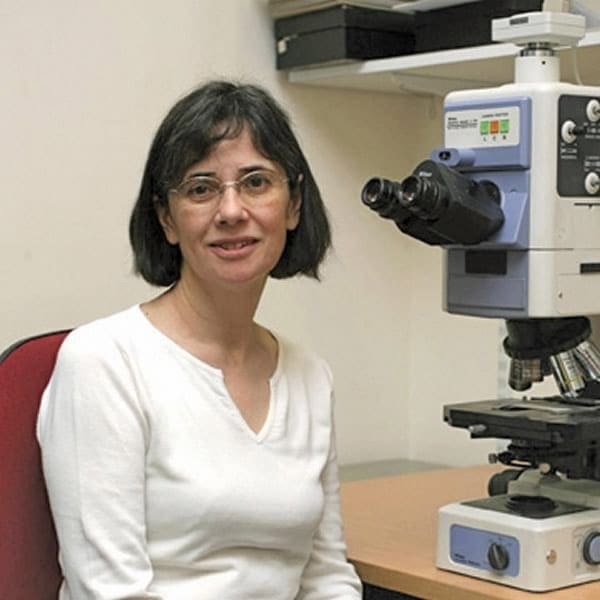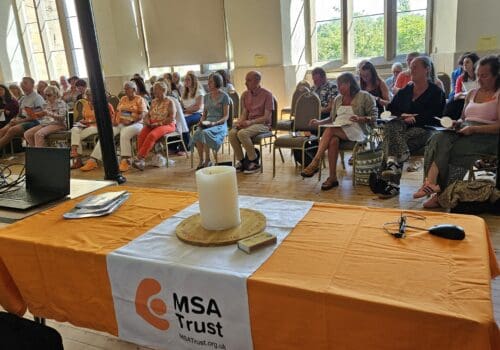New research studies funded in 2018
John Telford is a lay-member of our Scientific Advisory Panel and in our latest blog he reports on the three research studies we will be funding this year…
The topic for the Blog this time is the set of research projects that have been accepted for funding by the Trust. The Scientific Advisory Panel met in February to decide which projects should be recommended to the Trustees. I was there as a lay representative to look at the projects from the point of view of people with MSA and the members of the Trust. Three of the five projects presented were accepted and I would like to describe why it was thought that spending money on these in particular was worth it and was likely to bring us closer to a cure or, at least, better treatments.
The potential benefit of two of the projects is easier to appreciate than the third so let me start with those.
Both of these projects are to do with getting an early, firm diagnosis (the third project could help with this too.) We all know that even in the later stages one cannot be sure that the disease is MSA and not something else. The only way to confirm MSA at present is by post-mortem examination of brain cells so another method is clearly needed. Although there is nothing available yet that will slow down or cure MSA, knowing for sure that it is not something else would mean that other, futile, treatments would not need to be tried. Furthermore, knowing that someone definitely has MSA would mean that treatment could be focussed on those symptoms that are known to be particularly troublesome such as urinary problems, constipation, balance and gait, speech and swallowing. Such symptoms get worse at a faster rate than in diseases such as Parkinson’s and so knowing that it is definitely MSA would lend more urgency to getting them tackled.
There is another aspect too which relates mainly to the researchers who are trying to find something that will slow down or stop the disease process. How will they know if a new treatment is effective? Current clinical tests are a bit of a blunt instrument because everyone knows that how one feels on the day of the consultation can vary so much. Both of these projects should provide a way of measuring objectively how things change as the disease progresses and so will provide a way of telling more accurately and sensitively whether the progress is being slowed down by a treatment being trialled. This could mean trials needing fewer people and results which were more dependable.
Identification of Longitudinal Biomarkers in Multiple System Atrophy
 The first project will be run by Prof Henry Houlden at the University College of London Institute of Neurology at Queens Square where the brain bank is housed. Prof Houlden has been working on MSA for many years and is a prime mover of the PROSPECT study which is collecting biological samples from MSA patients throughout the UK. This bank of samples from hundreds of patients will be available to this new project. Samples of blood serum and plasma and cerebrospinal fluid (CSF) (which is the fluid that surrounds the brain and spinal chord) will be examined for the presence and concentration of various biochemical substances that may help distinguish MSA from other neurological conditions. How these substances change as the disease progresses will also be measured.
The first project will be run by Prof Henry Houlden at the University College of London Institute of Neurology at Queens Square where the brain bank is housed. Prof Houlden has been working on MSA for many years and is a prime mover of the PROSPECT study which is collecting biological samples from MSA patients throughout the UK. This bank of samples from hundreds of patients will be available to this new project. Samples of blood serum and plasma and cerebrospinal fluid (CSF) (which is the fluid that surrounds the brain and spinal chord) will be examined for the presence and concentration of various biochemical substances that may help distinguish MSA from other neurological conditions. How these substances change as the disease progresses will also be measured.
A multimodal imaging study to improve initial diagnostic accuracy for Multiple System Atrophy
 The second project, headed up by Prof Nicola Pavese at the Institute of Neuroscience, Newcastle University, uses a parallel approach: looking at the differences between MSA brains and normal brains and seeing how they change over time using two scanning techniques. The first technique is MRI scanning and recent developments in the technology make it possible to observe changes in the brain that could not be detected before. Amusingly one of the recently-developed MRI techniques has the initials NODDI. The second technique is Positron Emission Topography (PET) scanning which is an existing but expensive technique for evaluating Parkinson’s and MSA pathology and this will basically be a way of validating the MRI results.
The second project, headed up by Prof Nicola Pavese at the Institute of Neuroscience, Newcastle University, uses a parallel approach: looking at the differences between MSA brains and normal brains and seeing how they change over time using two scanning techniques. The first technique is MRI scanning and recent developments in the technology make it possible to observe changes in the brain that could not be detected before. Amusingly one of the recently-developed MRI techniques has the initials NODDI. The second technique is Positron Emission Topography (PET) scanning which is an existing but expensive technique for evaluating Parkinson’s and MSA pathology and this will basically be a way of validating the MRI results.
The Scientific Advisory Panel, which recommended these projects, are convinced that the teams carrying them out are of proven competence and ability. It is also clear from the layperson’s point of view that these practical steps towards accurate diagnosis and reliable measurement of the disease process are important for both people with MSA and the research community.
It is not so easy at first look to say the same for the third project because it is far less easy to understand if you are not a biochemist working in this immediate field! So, I’ll do my best to bring out the salient points without putting you to sleep with the technical details.
Understanding selective brain regional vulnerability in Multiple System Atrophy

This project is about understanding more about what goes on in brain cells when a person has MSA, how it is different in different parts of the brain and whether the particular biochemical differences that they are focussing on is a cause or an effect of the disease. This is the sort of basic research which is aimed at providing a better understanding about the disease mechanism therefore pointing to ways of intervening effectively and rolling it back.
I find it useful to think of each cell in the body and brain as a small city. Within it there are concrete structures like houses factories and public buildings, roads and railway lines with vehicles and trains on them carrying people and goods, there is electricity and gas connected through pipes and wires, deliveries being made using vehicles and the post, services to keep us healthy and inform and educate us and services to carry away our waste products and rubbish. Suppose that in this amazingly complex scenario you become aware that something is deteriorating. Maybe people are getting ill and dying or businesses are ceasing to operate. Of course you look for the reason for this. Maybe you find that rubbish is not being collected. Or energy is not getting to homes so that they can’t be heated. Or stuff is not being transported around. Equivalent things might be observed in sick cells. Indeed once one deficiency occurs, others might follow. Perhaps the lack of fuel has led to dustcarts not being able to collect the bins. Maybe a breakdown in electronic communication means that people and companies can no longer provide essential services. Looking from the outside it might be extremely difficult to know what root cause set off the comprehensive deterioration. It could be something internal or result from an external attack.
What goes wrong in cells when a person has MSA is a conundrum and there is no global news-medium to turn to, to reveal the history of events leading up to the calamity. And this third project – and many other research projects around the world – is engaged in working out what is the root cause of what has gone wrong. Rectifying the various consequences to sub-systems – energy failure, waste accumulation, social unrest etc – is worth doing but tackling the root cause is essential to stop them all happening again.
Different researchers are looking at different problems in brain and other cells affected by MSA and related diseases. This third project is looking at methylation and hydroxymethylation. You can be excused for not having the slightest idea what this is! What is important is that those on the Scientific Advisory Panel agreed that this relatively new area of study is likely to shed a lot of light on the disease mechanism. It has been found that methylation and hydroxymethylation affects the ways in which the genes work and can turn them on and off so that they produce more or less of the cells’ working proteins – or produce products that harm the cell. A lot of preliminary work has already been done by the team led by Prof Janice Holton, also at the Institute of Neurology of UCL. The project will build on this work with the new knowledge derived helping in several ways. These include identifying targets for pharmacological intervention based on a better understanding of the biochemical mechanisms altered by the disease. Also, since there is evidence that in MSA different brain areas are affected to different extents by methylation and hydromethylation, better diagnosis could result if a recurrent pattern of differential affectedness is discerned. Furthermore, disease progression could be accurately assessed by how this pattern changes over time.
These three projects need to be seen in the context of the other research into MSA going on all over the world. Different pieces of the jigsaw are being discovered and fitted in and we are much closer to understanding what is at the root of MSA. Far more research work has been devoted to understanding Parkinson’s disease which is 40 times more common than MSA. As both Parkinson’s and MSA have at their heart the misfolding of an essential protein known as alpha synuclein there is the hope that potential new treatments for Parkinson’s could benefit MSA. Sauce for the goose could be sauce for the gander. The MSA Trust is a small organisation with comparatively little money to spare but it is plugged into all the International Conferences where progress is discussed – such as the 6th MSA Symposium that Karen Walker reported on in the last blog. These three projects should make an important contribution to the world-wide effort to boot out MSA.
John Telford
Lay member, Scientific Advisory Panel
Disclaimer: The views and opinions expressed in the blogs published on these pages are those of the authors and do not necessarily reflect the official policy or position of the MSA Trust.
Recent Posts

MSA Candlelight 2025
19 Jun 2025 | 2 comments

International Nurses Day 2025
12 May 2025 | 1 comment


I was diagnosed with Parkinson”s syndrome in may of last year. I had essential tremors since age 55. I have a stooped posture, right arm was not moving. I also have a pulsating feeling in my body. My legs tingle and they were cold.i was advised to give a try on Total cure herbal foundation herbal formula by my doctors which i truly did and the herbal treatment help me get rid Parkinson disease PD within the short period of 15 weeks usage,please do not hesitate to place an order from them at http://www.totalcureherbsfoundation.com because the herbal products relief me… Read more »